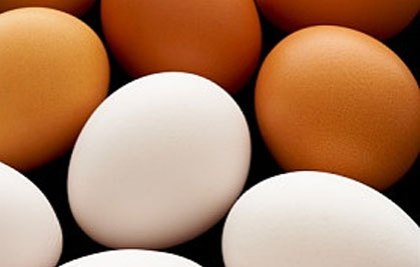I like to eat eggs.
They are a wonderful source of nutrition is a small and easily carried package. Cooked in an omelet or hard boiled for later, they are one of the most perfect of foods. And if you can, by raising chickens, a food that keeps on giving. A perfect addition to a Responsible Survivalist’s stable of sustainablity.
So I was interested when Lori Bongiorno over on Yahoo News posted a short informative article on Eggs this morning titled “Four Myths About Eggs”.

“Myth: Brown eggs are different than white.
Fact: The only difference between a brown and white egg is the color of the shell, which is merely a reflection of the breed of the hen. In general, but not always, hens with white feathers and earlobes lay white eggs and those with dark feathers and red earlobes lay brown eggs.
One isn’t healthier, more “natural,” or more eco-friendly than the other. There aren’t any differences in nutritional quality, flavor, or cooking characteristics.
Myth: Free-range eggs come from hens that roam freely outdoors.
Fact: The claims are not regulated for eggs, according to Consumer Reports. So there is no guarantee that the hen that laid the eggs ever saw the light of day. Of course, it may have spent time outdoors, but the “free range” label doesn’t mean anything. The following labels are also meaningless when it comes to eggs: “free roaming,” “hormone free,” and “raised without antibiotics.”
Myth: Organic eggs are healthier.
Fact: They certainly can be, but it all depends on the chicken’s diet. Organic eggs come from hens that are fed a 100-percent organic diet. However, what really matters when it comes to nutrition is whether the hens were raised on pasture. Studies, such as those conducted at Penn State University and by Mother Earth News, found that eggs from chickens that ate grass and insects contained higher levels of omega-3 fat, and vitamins E, A, and in some cases D.
If you want eggs from hens that are raised on pasture or spend a lot of time outdoors, then you’ll have to find a farmer you trust at your local farmers’ market.
Myth: Egg substitutes are simply eggs (or egg whites) without the shells.
Fact: Most products have added stabilizers, thickeners, vitamins, carotenes, and, sometimes, spices, according to Marion Nestle, author of What to Eat. She also points out that they cost about twice as much as real eggs. (A pound of egg substitutes weighs slightly less than a dozen small eggs.)
Of course, if you can’t eat egg yolks for health reasons or have no use for them, egg substitutes are a good option, and most products only have a tiny percentage of additives. Just read the labels before buying.”
—–
I have to admit I’ve been buying the brown eggs recently just because of that first myth, thinking they were more healthy. Now I’ll have to look closer at the labels.
Or check out the local farmer’s markets, which is on my to-do list for this Spring. A co-worker has chickens on her property. I’ll have to ask her if they are laying yet. In the mean time, here are some other facts about eggs:
Pale Yolks: The color of the yolk has nothing to do with an egg’s nutritional value but rather everything to do with a hen’s diet. Deep yellow yolks are typically from chickens that are fed yellow corn and alfalfa meal. Pale yellow yolks are from hens fed wheat or barley. Cage-free chickens that forage and eat a variety of grains lay eggs with a deep orange-yellow yolk. The more carotene or vitamin A eaten by the hen the more yellow the yolk but pale yolks are just as nutritious as dark ones.
Cholesterol: According to a study done at Harvard University, eating one egg per day does not increase the risk of heart disease or stroke. The study tracked 115,000 men and women and measured their health against egg consumption. They concluded that healthy people can eat an egg a day without raising their cholesterol to harmful levels.
Nutrition: A large egg contains 70 calories, 6 grams of protein, and 5 grams of fat, of which 2 grams are saturated fat. The yolk of the egg contains almost twice as much healthy monounsaturated and polyunsaturated fat as saturated fat. A whole egg contains only 1.55 grams of saturated fat.
The white contains most of the protein, and the yolk has all the fat. Eggs are excellent sources of nutrients including vitamin B12 and the antioxidant lutein, which is important for healthy eyes.
Freshness: One simple test of freshness is to place an egg in water: generally, if the egg is stale it will float and, if it sinks, it is fresh. This is because as the egg gets older, the size of the air sac increases, making it float.
Cleanliness: Egg shell becomes more porous when wet, making it easier for bacteria to get inside the egg. Discard dirty eggs. Never wash them.
Protein: Eggs contain about six grams of high-quality protein each, and compared to other protein sources, eggs are inexpensive. A dozen eggs weighs about 11/2 pounds, so the price per pound is two-thirds the price per dozen.
1 Comment so far
Leave a comment
The thing is… even small farmers wash eggs… often in Clorox… eew… sandpaper can be used to retouch eggs for fussy customers…
Comment by leavergirl May 25, 2010 @ 11:21 pm